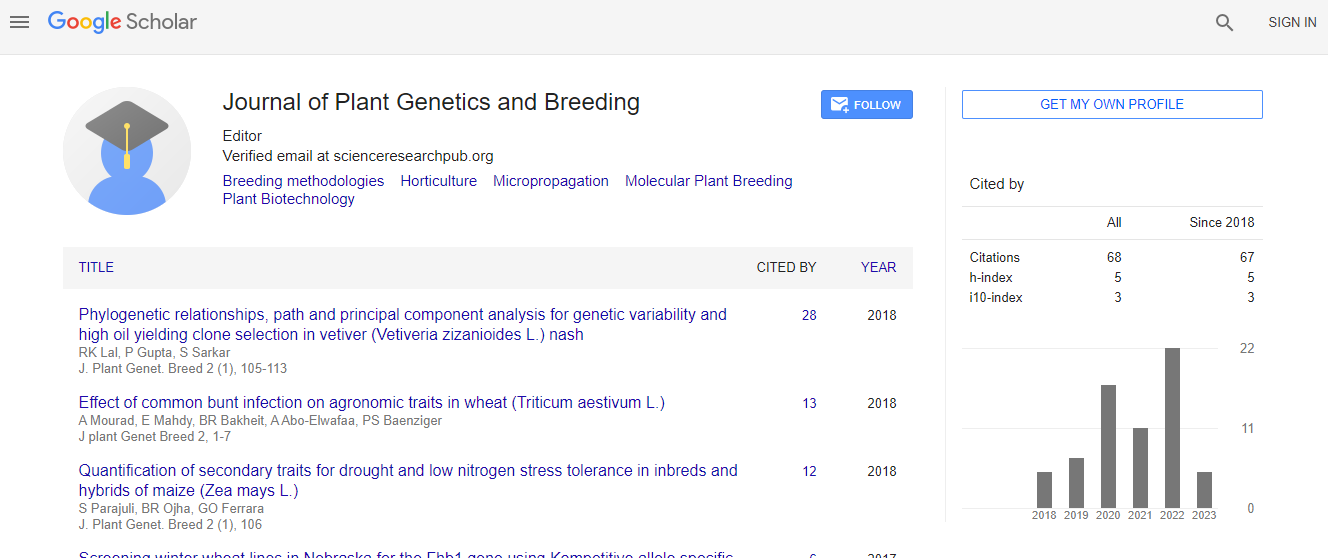Announcement of Special Issue: Plant Genetics Innovations
*Corresponding Author:
Copyright: © 2020 . This is an open-access article distributed under the terms of the Creative Commons Attribution License, which permits unrestricted use, distribution, and reproduction in any medium, provided the original author and source are credited.
Abstract
The development of new plant varieties is a long and tedious process involving the generation of large seedling populations for the selection of the best individuals. While the ability of breeders to generate large populations is almost unlimited, the management, phenotyping (genetic studies) and selection of these seedlings are the main factors limiting the generation of new cultivars. Genomic (DNA) studies for the development of marker-assisted selection (MAS) strategies are particularly useful when the evaluation of the character is expensive, time-consuming or with long juvenile periods. More recently, proteomic (proteins and enzymes) and transcriptomic (RNA) studies have been used for the clarification of the mentioned genomic studies.
Papers submitted to this Special Issue must report high novelty results and/or plausible and testable new models for the integrative analysis of the different approaches applied to plant breeding including genetic (phenotyping and transmission of agronomic characters), genomic (DNA regions responsible for the different agronomic characters), proteomic (proteins and enzymes involved in the expression of the characters) and transcriptomic (gene expression analysis of the characters) approaches for the development of new MAS strategies. In addition, the application of massive sequencing methodologies (“deep-sequencing”) of the genome (DNA-Seq) and transcriptome (RNA-Seq), based on lowering the costs of DNA sequencing, could be an additional interesting approach in this Special Issue.
The aim of this special issue is to show the current status of our knowledge and research in plant genetics and gene study. The scope covers a wide and diverse scale of modern technologies, scientific approaches, and research aimed at achieving a better understanding of all aspects of genetics in plants including crops and native and commercially important plant species. All completed study and research in any aspect of plant genetics and gene study are encouraged to be submitted for inclusion in the special issue. We especially welcome multidisciplinary scientific papers, and reviews making clear and wider explorations of the topic.
Potential topics include but are not limited to the following:
- Genetic aspects of gene expression and regulation in plants
- Genetics and gene study in plant development and stress responses
- Mendelian genetics and epigenetics in plants
- Molecular genetics, gene structure, and function in plants
- Molecular markers, marker-assisted selection in plants
- Plant genetics and applications in plant breeding
The journal places special emphasis on studies dealing with integration of modern and traditional plant breeding techniques. The Journal of Plant Genetics and Breeding is helmed by an editorial board comprised of acclaimed scientists from all over the world. Every article is subject to a rigorous peer review. The journal maintains the highest standards in terms of quality and originality. In addition to Research Articles, the Journal also publishes high quality Perspectives, Commentaries, and Reviews to pique the readers’ interest.
The team at the Journal of Plant Genetics and Breeding provides the authors with a rapid and extremely streamlined editorial process. The Journal provides an encouraging platform for the scholars and researchers to share their significant contributions in this field. Submit manuscript at https://www.scholarscentral.org/submission/plant-genetics-breeding.html or send as an e-mail attachment to the Editorial Office: plantgenetics@scienceresearchpub. org

 Spanish
Spanish  Chinese
Chinese  Russian
Russian  German
German  French
French  Japanese
Japanese  Portuguese
Portuguese  Hindi
Hindi 